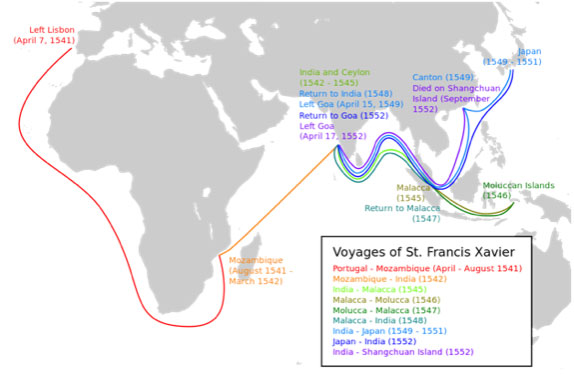Feast Day: December 3rd

We have one more saint to meet during our investigation of baptism. This week we celebrate the saint who was baptized Francisco, and grew up in Javier [Xavier] of the Kingdom of Navarre (nowadays in North East Spain), with a prosperous farmer for a father and a mother claiming noble blood. The prosperity was tenuous at best, his homeland being invaded by King Ferdinand of Aragon (who you might know as the husband of Isabella, and sponsor of Christopher Columbus) when Francisco was 6. During the next 18 years of war, Francisco would lose his father, and most of his family’s castle would be demolished.
Still, at the age of 19, he was able to begin his studies at the University of Paris, where, in God’s good providence, he fell in with Pierre Favre (a long time friend) and Ignatius of Loyola (a new friend, and far older than both other men, himself a convert-by-cannonball, which is a story for another day…). These friends sought to convince the vivacious Francisco that to follow God would offer him a far more exciting life than to spend his life seeking worldly fame. As he studied philosophy (and then taught it), and then studied theology, Xavier gradually was won over by the earnest Ignatius and in 1534, chose with 5 other men to go through the Spiritual Exercises and definitively join together in poverty, chastity, and obedience (specifically, individually, in service to the Pope) and to go on pilgrimage to Jerusalem to see where God wanted them to offer their labors for the salvation of souls. Not dissimilar from 11 apostles 1500 years before, the 10 men (as it grew to a year later), praying in a nondescript chapel on a hill of Paris, would bear fruit far beyond their human abilities.
Francisco offered his services as secretary of the new order, daringly named the Society of Jesus, though Francis’ role would remain mundane for 6 more years. But then, in 1540, Pope Paul III (the one who called the Council of Trent first supported Michelangelo’s efforts as an artist, and also given the go ahead for the Jesuits to form) now requested that they offer their services as missionaries to the new Portuguese discoveries in the East Indies. Two other early Jesuits were tapped for the (presumably one-way) trip, but one came down sick just before they were to leave, and Ignatius asked Francis to take his spot.
The eager 34-year-old left Rome in March, arrived in Portugal in June, and spent 8 months preparing for the voyage. The pair departed Europe in April of 1541, arrived in Mozambique in August, and Goa, India, by May, 1542. The following three years would be packed with caring for the natives of Southern India, building and working in hospitals, educating the peasant population, and baptizing tens of thousands every month. He repeated this feat in Malacca (now Malaysia, in 1545), Maluku (now Indonesia, in 1546), Japan (in 1549), and China (in 1551, dying just before arriving on the mainland) facing countless deprivations, immense struggle to learn the native languages, and hostility by the cultic leaders who had previously sustained themselves off the lesser castes. His body was returned to Goa, India, where it remains to this day, though, as only Catholic are apt to do, his arm, the same one that baptized hundreds of thousands, was eventually taken all the way back to the Jesuit headquarters in Rome, where it has stayed ever since (except a few excursions “on tour” around Canada, Australia, and other countries that even this legendary missionary couldn’t reach in this life).
Perhaps what we are meant to learn from this saint is a simple truth: Christianity is an incarnate religion. Everything we believe is founded upon our God becoming man. Continuing this humility: today God depends on human lips, and limbs, and learning to preach, and baptize, and teach for Him. And, for the very same reason, it is Christianity, and Christian saints, that relentlessly cherish the incarnate persons we encounter in every culture the world over, and none the less, desire ardently to bring them that incarnate love given to the Church in her scripture and sacraments. May we have the gumption to do the same!
Many, many people hereabouts are not becoming Christians for one reason: there is nobody to make them Christians. Again and again I have thought of going round the universities of Europe, especially Paris, and everywhere crying out like a madman. Riveting the attention of those with more learning than charity: What a tragedy: how many souls are being shut out of heaven and falling into hell, thanks to you!
– Fr. Dominic Rankin keeps waiting for the growth spurt that is sure to send him above his current height of 5’6” (on a good day), but he was happy to realize that sanctity does not depend on stature, for Francis Xavier never surpassed 5’4”, yet his youthful skill at running and high-jumping were surpassed one-hundred-fold by the grace with which he ran the Christian race and reached the heights of glorifying God.

Thousands of miles, and millions encountered. You and I will do the same in our lives. But do we as strongly desire to bring Christ to every parsec, and every person?.